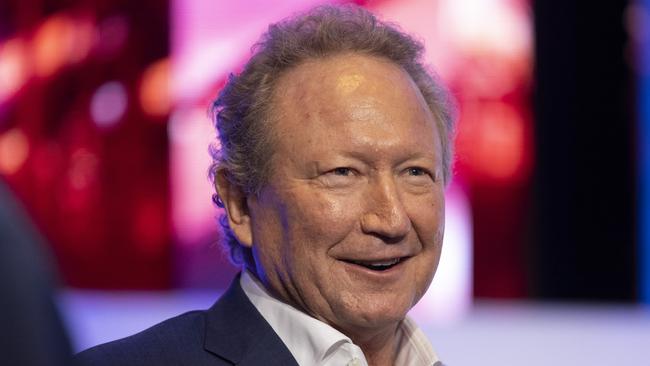Forrest calls for tax on unrecycled plastics as world production increases
Andrew Forrest’s philanthropic arm has called for Australia to introduce taxes on unrecycled plastics, after it found worldwide plastic production had continued to rise.

Andrew Forrest’s philanthropic arm has called for Australia to introduce taxes on unrecycled plastics, after it found worldwide plastic production had continued to rise despite the increased focus of governments and consumers.
Dr Forrest’s Minderoo Foundation on Monday will release its latest Plastic Waste Makers Index, with the report to show that single-use plastic waste has continued to grow in recent years.
The continued growth in single-use plastic waste reflects the ongoing economic imbalance between recycled plastic and virgin plastic, the report says.
Report co-author and Minderoo Foundation’s Plastics initiative head of finance and transparency, Dominic Charles told The Australian that the increase in plastic waste showed that more action was required by policymakers.
“Despite all the awareness on the issue of plastic pollution, despite commitments being made by industry, despite politicians and policymakers talking about trying to address it, the truth is that the situation is getting worse and it‘s getting meaningfully worse,” he said. Minderoo is working on research into the size of the “plastic premium” – or tax – that would be required to make recycled plastic more cost competitive.
The UK recently introduced a plastics tax in UK of GBP200 ($348) per tonne of plastic, but Mr Charles said the early signs were that plastic buyers were so far willing to simply pay the tax, rather than switch to recycled polymers, given the price gap between the two products was still too wide.
The economic challenge around recycling plastics was underscored last year when REDcycle – which had contracts to collect and process soft plastics around Australia – collapsed.
Mr Charles said Australia, like most developed nations, was near the top of the list for the intensity of single-use plastic per person.
While recent steps in some states to ban some single-use plastic items was a positive first step, he said more needed to be done.
“What we now need is to take the more ambitious policy steps, things like minimum recycled content standards and other kinds of fiscal measures like taxes on virgin plastics and subsidies on recycling,” he said.
The cost of levies on plastics to consumers would pale against the cost of doing nothing.
“The consumer may feel that a few pence on the price of a bottle of water is meaningful, but we would say that consumers are already paying,” Mr Charles said.
“They’re already paying in the cost of environmental pollution and the cost to human health from mismanaged waste and chemicals used in plastics. This is like paying for the prevention, which is always going to be cheaper than paying to clean it up.”
Minderoo’s research named US oil and gas major ExxonMobil as the world’s biggest producer of virgin polymers bound for single-use plastic, just ahead of Chinese company Sinopec and chemicals giant Dow.
Minderoo’s plastics initiative is one of several environmental causes being bankrolled by Dr Forrest and the profits of his iron ore miner Fortescue Metals Group. Dr Forrest is also driving Fortescue’s efforts to become a major producer of green hydrogen.






To join the conversation, please log in. Don't have an account? Register
Join the conversation, you are commenting as Logout